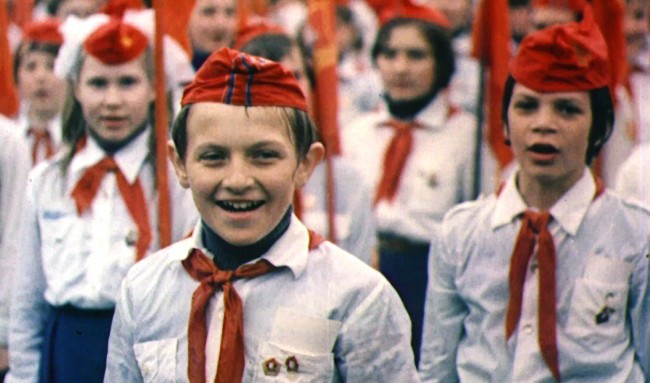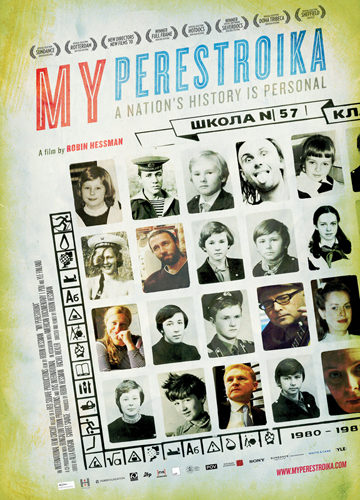
In her first feature, documentarian Robin Hessman looks at Russia’s 1990’s reforms through examining the lives of five former classmates who came of age as the USSR crumbled. My Perestroika neatly knits together these intimate portraits within the context of Russia’s cultural and political revolutions to create something surprising and engrossing.
Hessman presents five Russians who were part of the last generation of children to be indoctrinated with Soviet Union ideals of community, communism, and conformity. Today they exist in different social classes, revealing the truly revolutionary changes their country underwent during their formative years. Olga, the prettiest girl in her class, is now a single mother, living just above the poverty level. Andrei, who dreamed of joining the Soviet party as a boy, has become a wealthy businessman who bought into Russia’s thirst for Western fashions by purchasing a French shirt franchise. Ruslan, currently a street busker living on the fringe of society, was a rebel early on and fell into Russia’s emerging punk scene and became a rock star before leaving the band over a political dispute. His best friend, Borya, channels his youthful rebellion into raising his son to question authority and be self-actualized. He and his wife Lyuba, who was a conformist well into her teen years, both teach history, but marvel that kids today cannot comprehend the mindset of life in the USSR. “It was beyond good and evil,” Lubya says of her time as a Communist Youth, explaining that they regularly wrote to American press in hopes of preventing nuclear attacks. All together, their intersecting stories and perspectives on the politics that have influenced their lives combine to form a thought-provoking and layered exploration of Russia’s Perestroika (Restructuring) and its legacy.
Hessman’s doc screened at last year’s Sundance Film Festival and NDNF, and it’s easy to see why. As an American raised in the shadow of the Cold War, she (like her peers) was told that the Russians are our enemies, hell-bent on the destruction of the US and our way of life. It is this “us versus them” mentality that she steadily subverts throughout Perestroika, slowly showing how we’re not so different after all. She begins by tenderly unfolding the lives of her subjects, revealing each to be more complicated as the film unrolls. And as it does, her subjects’ nostalgia and lamentations unfurl until their complaints seem shockingly familiar. While their childhood was marked with political influence unfamiliar to American youth, their adulthood allowed for the kind of freedom seen stateside. Their destinies no longer laid out for them, some thrived and others floundered. And so their refrains sound similar to those of countless Americans: Kids today don’t read like we used to. The quest for money is ruining the world! People today don’t pay attention to politics like they should. On election day, Andrei resignedly explains that the modern Russian has no real concern for politics, declaring that if the man on the street can still get his vodka, he doesn’t care who is in power. Swap the vodka for beer and you’ve got the exact forlorn warning my high school civics teacher routinely impressed upon us each November.
Beyond these meta thematic ties, Hessman also displays a flare for visual storytelling. Deftly balancing vintage home movies and old propaganda videos with present day footage, Hessman crisply reveals the changes in Russian life along with what has remained constant. Black and white footage of uniformed children marching to their first day of school with flowers in hand (an old tradition) is intercut with modern children carrying flowers but diversely dressed in Western-influenced fashions. Instructional videos about what to do in case of nuclear attack are paired with present-day posters about what to do in case of terrorist attack. These juxtapositions prove haunting in context as the parents wonder aloud how different Russia really is from the one they knew as children.
Ultimately, My Perestroika blends deeply personal tales to create a poignant portrait of growing up amidst political uncertainty. Hearing these men and women so casually unveil the harrowing realities they’ve lived through is stirring, but what is most striking is that these are stories likely to be told again and again as children all over come of age in this new era of uncertainty and war. Complex and poignant, My Perestroika is not to be missed.
My Perestroika is now playing at IFC Center in New York. To see if it’s coming to a theater near you, check their screening site.


